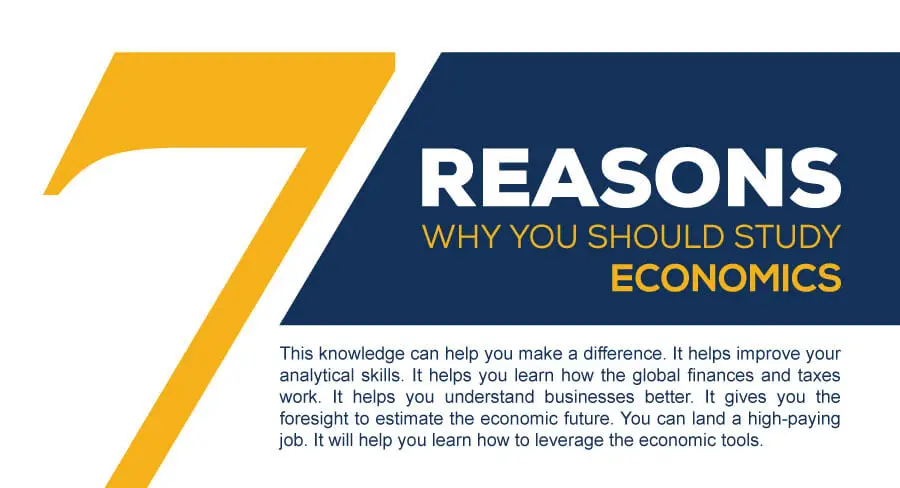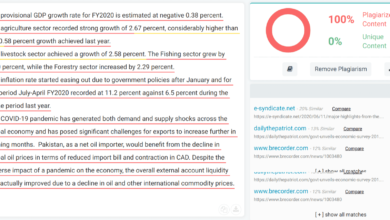7 Reasons Why You Should Study Economics
Students who take an economics course gain the fundamental knowledge and abilities needed to interpret financial data, create winning company plans, and examine consumer buying patterns.
Economics is a social science that examines how resources are used and managed. It can be separated into macroeconomics, which looks at the economy as a whole, and microeconomics, which focuses on individual decisions. Both categories forecast the efficiency and behavior of the market.
Analyzing resource use and management by people, organizations, and nations is a key component of studying economics. It is separated into two categories:
- Macroeconomics.
- Microeconomics.
Success in any field depends on a solid understanding of fundamental concepts, which factors like family history, environment, peer group affiliation, or vocational desire can influence.
Why Should You Study Economics?
Economics has become one of the most important fields of education in modern times. Moreover, with extra help from online platforms, institutions, and tuitions like Ace Your Economics tutor, students excel in the subject daily.
Here we have the seven most important reasons why you should study Economics for a better future—

1. This Knowledge Can Help You Make A Difference
Users stress the importance of researching and applying economic knowledge that can significantly impact global change.
Economics goes beyond numbers and graphs to encompass human behavior and decision-making processes.
Studying economics provides insight into market dynamics and the impact of public policy, enabling individuals to make informed decisions about their finances and shaping public policy.
The interdisciplinary nature of economics, which overlaps fields such as sociology, psychology, and political science, enables economists to approach complex problems from multiple perspectives and derive more comprehensive and effective solutions. However, achieving these goals requires passion, hard work, and perseverance.
Keeping learning and staying true to your intentions despite challenges and questions is important.
In this way, individuals can overcome setbacks and lack of motivation and make meaningful contributions toward pursuing those goals.
2. It Helps Improve Your Analytical Skills
In addition to enhancing statistical and mathematical abilities, studying economics also provides students with the theoretical understanding and analytical techniques they need to succeed in the workplace.
With this expertise, complex data sets can be handled efficiently, vast quantities can be accurately analyzed, and issues may be solved quickly.
A solid understanding of economics enables people, businesses, and markets to comprehend and analyze their behavior from a wider perspective, allowing for well-informed financial, policy, and consulting decisions.
The ability to see patterns, trends, and linkages in complicated data is made possible by analytical abilities acquired by studying economics, making people important assets in today’s data-driven world.
In conclusion, studying economics helps people develop their statistical and quantitative skills and the theoretical understanding and analytical skills required for a successful job.
An economics education gives you an advantage in various areas, such as predicting market trends and examining consumer behavior.
Read More: How Early Learning Impacts Long-Term Academic Achievement?
3. It Helps You Learn How The Global Finances And Taxes Work
Studying economics offers important insights into topics that affect daily living, such as taxation, inflation, and interest rates.
It assists in identifying actual problems and foreseeing upcoming changes in the world. The cost of goods and services, employee remuneration, and the formulation of policy are all influenced by economics.
It gives people the analytical abilities to assess and suggest workable solutions to economic problems, which may be used in constructing personal financial plans and governmental policy.
Those with a strong grasp of economics are better equipped to survive and prosper in the increasingly intricate and interconnected global economy.
It offers a fresh worldview, enabling people to comprehend business opportunities and challenges, political regulations, and connections between other cultures and societies.
Real-world events are used to apply analytical capabilities, providing accurate predictions and suggestions.
This skill set is highly prized in today’s cutthroat employment market, where employers want people who can think critically and give fresh ideas.
4. It Helps You Understand Businesses Better
Economists possess valuable analytical thinking and problem-solving skills that can be applied to various industries and disciplines.
They analyze market trends, forecast future economic conditions, and assess the impact of government actions.
That’s why they are so important in helping businesses make informed decisions. Their expertise is sought after by businesses, governments, nonprofits, and consultancies.
Economists deeply understand supply and demand dynamics, cost analysis, and market structure, providing valuable insights and recommendations to improve business performance.
Every large company has economists with different areas of responsibility. Some experts research the market, while others work with marketers to create effective campaigns targeting the right audience, doubling a company’s bottom line in the long run.
Economists play a key role in large organizations by providing valuable insights and recommendations for improving business performance.
5. It Gives You The Foresight To Estimate The Economic Future
Instead of just studying graphs and charts, the sophisticated area of economics focuses on comprehending people’s rational conduct and decisions.
Even when assumptions are incorrect, predicting decisions and understanding behaviors are essential.
Economists examine cognition, biases, and epistemic intersubjectivity to understand economic behavior and ascertain whether a choice is logical or irrational.
Also, they look at previous data and trends to spot trends and accurately anticipate future economic results.
Economists can learn important insights about the intricate structure of economic behavior and its effects on people and society.
Economists can forecast future outcomes by examining the influence of external factors on decision-making and previous data, which advances the study of economics.
6. You Can Land A High Paying Job
An economics major offers numerous job opportunities, such as market research analysts, business consultants, and business consultants.
These professionals use charting, statistical analysis, and critical thinking skills to collect and interpret data to provide valuable insights to businesses and organizations.
Additionally, a business degree may open the door for her career as a business consultant, increasing the demand for professionals in areas such as government, finance, education, healthcare, and business.
Analytical thinking and the ability to interpret data using mathematical formulas and statistics are essential for economists.
Economic consultants are in high demand in government, finance, education, health care, and business areas.
The study of economics will help shape the models used to predict the impact of policy decisions, industry trends, climate change, and investments.
You get knowledge. Overall, an economics major can lead to various career opportunities, including the role of a business consultant.
7. It Will Help You Learn How To Leverage The Economic Tools
For data analysis, economics provides a wide range of theories and techniques that help with decision-making in the real world and understanding how economic issues affect company outcomes.
It assists in gathering information for sound business decisions, assessing the effects of economic issues, and applying supply and demand, market competition, and resource allocation principles.
Economics also shows how people, businesses, and governments behave when making economic decisions.
This information is useful in areas like finance, policy-making, and international relations, where it aids in negotiating trade agreements and navigating global economic dynamics by governments. It also aids in the formulation of effective policies by policymakers.
Ultimately, economics has many uses and can significantly influence decisions in many sectors.



